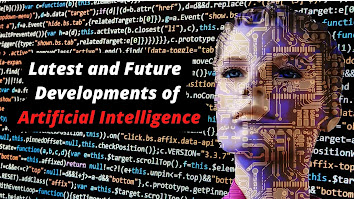Artificial Intelligence (AI), or machine intelligence, is a field that builds computers and robots that can process data in context to provide requested information or configure events based on findings. With strategies such as machine learning and neural networks, companies around the world are investing in teaching machines to ‘think’ more like human beings.
Artificial intelligence is one of the most
impressive technological advances in our time. Recent advances in artificial
intelligence have seen it apply to all industries and sectors. From
manufacturing and robots to medicine, supply chain management, and everyday AI
software, happen everywhere.
Nature Conservation by Machine
Learning In AI
Oxford University has utilized the latest
developments in artificial intelligence to develop new software that can detect
and track the faces of endangered animals like individual chimpanzees in their
natural habitat.
The software helps conservationists and
researchers to maximize the impact of their efforts. At the same time, reduce
the time and resources needed to identify and track endangered species.
Oxford DPhil student Dan Schofield trained
a machine learning model using more than 10 million images of wild chimpanzees.
The team intends to use the intelligence-making software to have a positive
impact on the conservation efforts of these endangered and other species of
animals.
AI Development in the Healthcare Industry
The latest development of artificial intelligence in the
healthcare world is enabling improvements in accurate diagnoses and clinical decision-making with the development of new
AI, telemedicine has been widely accepted by many full-time patient care centers.
Not only in the case of front desk availability, tele medicine is also
installed on portable devices for real-time information about patient data and
telemedicine applications with useful features such as text, video chat, screen
sharing, and file transfers to book appointments, tracking and
instructions.
Another major development of AI has been
the production of the COVID-19 vaccine. According to the Brookings Institution,
a nonprofit U.S. public policy organization, the goal is to solidify the
immunogenic virus that has caused the immune system to respond and machine
learning has been very helpful. According to experts, AI can detect the parts
of a virus that have the structures needed to stimulate the immune system.
Latest developments
in AI for National Security
These latest developments in AI have
consequences for changes in national security. The National Security Commission
on Artificial Intelligence (NSCAI) said AI "is changing the world,"
predicting that AI technology "will become a major source of energy for
companies and countries that use it." A report from the Belfer Center
accredited by the intelligence community has determined that AI has the
potential to become a flexible national security technology — along with
nuclear weapons, aircraft, computers and biotech — in large part because of its
military capabilities and advanced military and intelligence capabilities. In
the military context, AI is already being used to automate weapon systems and
enable predictable care by measuring possible failures in helicopter engines.
Cybersecurity In AI
This year 2022, the World
Economic Forum noted that cybercrime poses a greater threat to society than
terrorism. As technology takes over our lives, cybercrime and cybercrime are
becoming more and more serious problems. Palo Alto Networks recently launched
Magnifier, an AI solution for behavioral analysis. Models network behavior
using formal and informal Mechanical Learning to improve threat detection.
Chronicle is a powerful source of
cybersecurity data, allowing for quick search and retrieval. The idea is that
security teams already have the information they need within their systems, but
it is often hidden among millions of data centers. Advanced search engine
learning skills are fast search drivers.
The good news is that artificial
intelligence can be a useful weapon in the fight against cybercrime, as AI is
very good at analyzing network traffic and detecting patterns that may promote
malicious intent.
Autonomous Cars In AI
Tesla says its cars will show full driving
ability by 2022. The growing popularity of autonomous, AI-enabled vehicles is a
topic being considered. According to PwX forecast, 40% of miles in Europe could
be covered by private cars by 2030. The US Department of Transportation also
believes that road transport, one of the world's largest manufacturers,
controls trucks and self-driving vehicles. It can help improve fuel consumption
and improve energy and time management.
Its rivals - including Google, Apple,
General Motors, and Ford - are all expected to announce major contributions to
the private car industry next year. In the year 2022, we will probably see the
first independent ship crossing the Atlantic from the U.K. goes to the U.S.
Vaccine
development In AI
The
recorded speed of vaccine development was partly thanks to AI models that
helped researchers analyze large amounts of data about the coronavirus. There are
tens of thousands of subspecies of extracellular proteins. Machine learning
models can filter through this data storm and predict which subdivisions are
most immune — that is, able to produce an immune response — and thus guide
researchers in designing targeted vaccines. The use of AI in vaccine
development may change the way all vaccines are developed in the future.
AI algorithm for science and medical teams
working to combat the virus. Linear Fold predicts the second sequence of
ribonucleic acid (RNA) sequences in the virus — and it does so much faster than
normal RNA coagulation method. Linear Fold was able to predict the second sequence of
SARS-CoV-2 RNA sequences in just 27 seconds, 120 times faster than other
alternatives. This is important, because the most important success of covid-19
vaccines has been the development of messenger RNA (mRNA) injections. Instead
of the usual methods, which include a small part of the virus to stimulate the
human immune response, mRNA teaches cells to make a protein that can trigger an
immune response, greatly reducing the time involved in development and
approval.


Comments